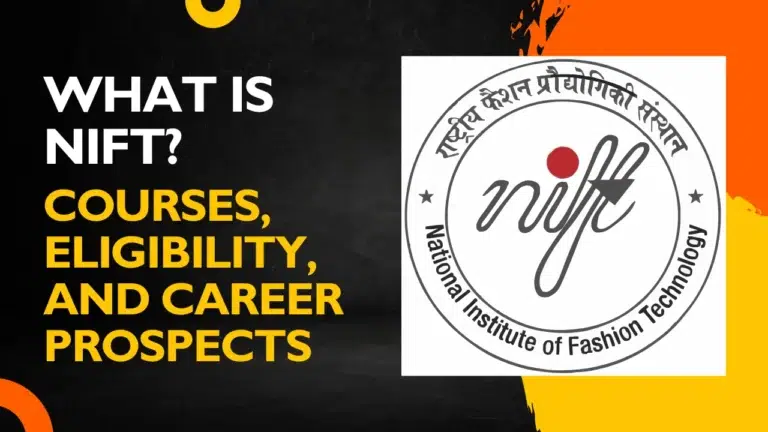The National Institute of Fashion Technology (NIFT) is one of the premier institutes of higher learning in the areas of fashion, design, technology, and management in India. It was set up in 1986 through an act of the Ministry of Textiles in the Government of India, and from the early days of a single campus in New Delhi, NIFT has evolved into a network of 18 campuses across the country. This article presents an exhaustive account of NIFT, its courses offered, eligibility for admission, and enormous career opportunities available to its graduates.
What is NIFT?
NIFT is more than just a centre of education. It’s the leader in the field of fashion education. It comprises all courses of design and management as well as those in the area of technology for the fashion industry. It is a platform for nurturing talents to contribute to the world fashion arena through innovation, creativity and strategic insight. The curriculum at NIFT ensures exposure and knowledge to students in the required skills necessary for the inherently competitive and evolving industry.
NIFT combines theoretical learning with practical exposure, so students can learn in a strong environment with the best industry practices, concepts, and technologies.
Courses Offered at NIFT
A comprehensive range of courses is available for the capture of various industries in fashion by the National Institute of Fashion Technology (NIFT). Here is a glimpse of a few important programs:
Undergraduate Programs:
- Bachelor of Design (B.Des): A four-year program with specialization in Fashion Design, Leather Design, Accessory Design, Textile Design, Knitwear Design, and Fashion Communication. The course aims at creative skills development, understanding of design principles, and practical application within the fashion industry.
- Bachelor of Fashion Technology (BFTech): Spanning four years, this program places emphasis on scientific and technical aspects of fashion, specifically apparel production, quality assurance, and textile technology. This program focuses on the manufacture and technical nature of fashion.
Postgraduate Programs:
- M.Des: A two-year program that deepens the study of design, offering specializations comparable to B.Des but with a more sophisticated emphasis on innovation, research, and strategic design management.
- MFM: This is a two-year course meant for business-minded individuals interested in the working aspects of fashion, namely marketing, merchandising, retail management, and brand strategy.
- Moreover, MFTech is a two-year post-graduate program in advanced technology applied in the fashion industry, including CAD/CAM for garments, production management, and quality control.
Doctoral Programs:
- Ph.D. for Fashion: Those who wish to enter careers in academics or contribute to the fashion industry through research can opt for a PhD program at NIFT, which will allow them to delve into the areas such as fashion design, technology, and management.
Continuing Education & Short-term Courses:
- NIFT conducts various short-term certificate programs and full-time diplomas under its Continuing Education Programme (CEP). These are offered for professionals wishing to upgrade their skill sets, or for enthusiasts wanting to decipher a limited area of fashion without going through a full degree.
Theoretical education and practical exposure to the industry are combined in this course to enable students to face future challenges and expectancies of the emerging global fashion market.
Eligibility Criteria for NIFT Courses
Whether a B.Sc., diploma or M.Sc. in applied art and design or textile design and technology, such eligibility criteria apply for courses for the following purposes in the National Institute of Fashion Technology:NIFT.
For Undergraduate Programs:
The Bachelor of Design (B.Des.):
- Age Limit: A candidate with an age of not more than 24 years as of August 1st in the year of admission will be considered. A relaxation of up to 5 years will be eligible for SC/ST/PwD candidates.
- Educational Qualification: Candidates must have either passed or are appearing in any 10+2 examination conducted by a recognized Central/State Board of Secondary Examination/any equivalent board.
Bachelor of Fashion Technology (BFTech):
- Age Limit: Same as for B.Des.
- Educational Qualification: Candidates must have passed or are appearing in the 10+2 examination with Physics, Chemistry, and Mathematics from a recognized board.
For Postgraduate Programs:
- Master of Design (M.Des), Master of Fashion Management (MFM), and Master of Fashion Tech (MFTech):
- Age limit: No upper age limit for postgraduation programs, so anyone can apply from experts to changing fields.
Educational Qualification:
M.Des and MFM: Must have a Bachelor’s degree from any recognized Indian institute/university, in any branch.
MFTech: Must have completed a Bachelor degree in BFTech from NIFT or equivalent (like a B.E./B. Tech from any recognized institute).
General Notes: Final year students in the year of admission may apply, provided they pass before admission. Entry to every program in NIFT involves an admission process of qualifying the NIFT Entrance Examination (NIFTEE), including the Creative Ability Test (CAT) and General Ability Test (GAT), followed by a Situation Test for B.Des or an interview for PG programs.
This is to ensure that the set students can meet not only the compelling academic requirements for entry but are qualified on the basis of creativity, technical skills, or management ability necessary to succeed within the dynamic environment of fashion.
NIFT Admission Process
The admission process of various programs at the National Institute of Fashion Technology (NIFT) is elaborate and competitive, geared to distinguish candidates exhibiting the right mix of creativity, technical knowledge, and inclination toward the fashion industry. A stepwise representation is here given of the admission process.
1. Application:
- Online Registration: The candidates have to go to the NIFT official website (https://www.nift.ac.in/) for online registration only when the admission session opens for them. It involves entering personal details, the educational background, course, and campus preference.
- Application Fee: The amount varies according to the program and category of applicant (General, SC/ST/PwD, etc.). Generally, payment is made online.
2. NIFT Entrance Examination (NIFTEE):
- General Ability Test (GAT): The quantitative ability, communication ability, English comprehension, analytical ability, general knowledge, and current affairs are tested. The format and content differ a little from undergraduate to postgraduate level.
- Creative Ability Test (CAT): For design programs (B.Des and M.Des), this test assesses creativity, observation power, design ability, and innovation in concept development in drawing and/or illustrative assignments.
3. Situation Test/Group Discussion/Interview:
- B.Des: After qualifying GAT and CAT, aspirants are invited for a Situation Test where they have to set up a three-dimensional model or design with given materials by following a specified time period. This test measures the understanding of materials handling, innovative problem solving, as well as aesthetic aspects.
- M.Des, MFM, MFTech: Candidates will have to complete personal interviews for MFM and MFTech after the written examinations, whereas M.Des candidates will have to undergo both a Situation Test and the Interview after GAT and CAT. The interview assesses the student’s interest, motivation, and clarity of thought in relation to a career in fashion.
4. Final Merit List:
- Weightage: Scores for courses like GAT, CAT, Situation Test (for B.Des & M.Des), and the Interview are tabulated as per the weightage defined by the Institution. A minor yearly variation applies to this distribution. Mostly, the allocation is done in the following manner:
- GAT: 30-40%
- CAT: 30-40% (for design programs)
- Situation Test + Interview: 20-30%
- Merit List: Based on the combined scores, the merit list is published, wherein candidates are offered seats on preferred campuses as per their rank and availability.
5. Counseling and Seat Allocation:
- Advisory Circua: The candidates emerging from merit lists participate in the counseling rounds indicating the campus and program of their choice according to their rank. The counseling rounds could be several in number in order to fill all the seats, including those vacated after the first allocation.
- Document Verification: Counseling occurs, and candidates must present all documents for verification like their mark sheets, certificates, etc.
6. Payment of Fees:
- Once the seat has been assigned, candidates required to pay the given admission fee to confirm and hold a seat. Missed timeframe leads to losing their seats.
Career Prospects After NIFT
NIFT graduates are essential to the fashion industry because they are well-trained in design, technology, and management. Following are some of the huge career opportunities available for NIFT graduates:
Fashion Design:
- Fashion Designer: Creating collections for fashion houses, working freelance, or launching one’s own label.
- Stylist: Styling for celebrities, fashion shoots, or film and TV productions.
Fashion Management:
- Brand Manager: This individual maintains the brand identity, marketing, and strategic growth.
- Retail Manager: Managing consergeates in fashion retail stores or e-commerce applications with a focus on sales and customer service and visual merchandising.
- Marketing Manager: Creating and executing campaigns to promote fashion products or services.
Fashion Technology:
- Production Manager: Responsible for overseeing manufacturing activities, including design and delivery, in such a way that manufacturing is efficient and of high quality.
- Quality Control Specialist: Ensures that products meet relevant industry standards before entering the market.
- Merchandiser: A department charged with maintaining equilibrium between supply and demand by acting as a conduit between designers, manufacturers, and retailers, ensuring product availability at reasonable profit.
Fashion Communication:
- Fashion Journalist/Editor: Work is basically there to write in fashion journals, magazines, blogs, and any digital media for matters concerning trends, events, and news affiliated with the industry.
- Visual Merchandiser: Designing retail areas to take a product from view to salability.
- PR and advertising specialist: Campaign creation and management for the promotion of fashion brands.
Beyond Traditional Roles:
- Entrepreneurship: Most of the NIFT graduates would leverage their skills to set up their own fashion venture: be it a boutique or a technology startup with a focus on fashion.
- Academics: From teaching at fashion institutes to research that furthers the frontiers of fashion education and practice.
- Consultancy: Providing expert advice on a sustainability approach to new market entries or embracing technology in fashion.
Global Opportunities:
- International partnerships and reputation with NIFT usually lead to opportunities abroad, where alumni work from different parts of the world in fashion capitals. NIFT also conducts foreign internship and exchange programs for such exposure.
- Several facets have contributed to the position of NIFT graduates as stout contenders in interventions pertaining to sustainability and innovation. First, as the practice is growing increasingly sustainable, there will be more opportunities for innovative intervention and leadership (whereas they may not be standing under a ‘eco-fashion’ or ‘upcycling’ tagline even when they are potentially driving tech-enabled solutions in fashion).
With a wide range of skills imparted by NIFT, along with its ties to the industry, it leaves its graduates with an excellent array of prospects, within India and outside, in this innovatively changing landscape of fashion.




